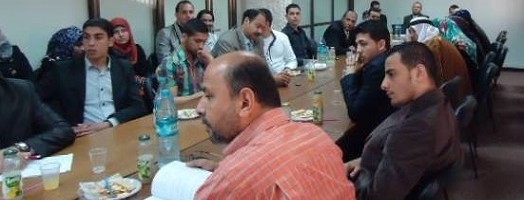An Assessment of the Draft Penal Law
the presentation was made by Advocate Salamah Bseiso, Deputy Chairman of the Palestinian Bar Association (PBA). The legal encounter brought together members of the legal community and representatives of civil society actors in the Gaza Strip.
In her opening statement, Ms. Lina at Tounisi, Coordinator of the IoL Gaza Office, welcomed the speaker and audience and made a briefing note about the IoL Legal Encounters programme. Designed to promote the rule of law principle, IoL legal encounters are tailored raise awareness of selected legal issues and concerns.
Advocate Bseiso provided an overview of the historical context of penal legislation in force in Palestine. Since the Palestinian Authority (PA) was established, a national consensus has articulated the need for a new Palestinian penal law.In light of legal disparity and multiple regulations, effective penal legislation is also not informed by modern legal developments. Through the World Bank-funded West Bank and Gaza Legal Development Project, a first initiative was made by the PA to enact a consolidated penal law.
A complete draft of the law was developed in 2001. However, the legislative process was suspended in 2003 due to a stiff opposition expressed by conservative powers in the Palestinian society. In 2008, following the internal Palestinian political split, the Legal Committee of the Gaza-based Palestinian Legislative Council (PLC) introduced amendments to the Draft Penal Law, which was approved in a PLC first reading. Before it was presented for a second reading, the Draft Penal Law was aborted by civil society opposition. To prepare it for a second reading, the PLC Legal Committee announced a plan in early March 2014 to endorse the Draft Penal Law. The Draft Law includes penalties derived from the Islamic Law (Sharia), including lashing, amputation of a thief’s hand, Qisas [Law of Retaliation], and an extended enforcement of the death sentence.
Advocate Bseiso made a presentation on key provisions of the Draft Penal Law, including penalties prescribed for crimes, misdemeanours and contraventions. Of these, death sentence is imposed on a married man guilty of adultery. In addition to confinement for a term of one year, a bachelor who is guilty of adultery will endure 100 lashes. A sexual offence that does not amount to adultery is penalised by 40 lashes as well as a fine of 2,000 Jordanian dinars. The Draft Law also provides for lashing in many crimes and offences, including drinking alcohol, gambling, and insults.
Of particular note, penalties prescribed by the Draft Penal Law include amputation of a thief’s hand. This punishment is a flagrant encroachment on human rights and dignity in light of the currently harsh and complicated economic situation, prolonged siege, unemployment, and impoverishment in the Gaza Strip.
Advocate Bseiso explored the position of civil society actors, particularly the PBA,who have refused the Draft Penal Law. First and foremost, deliberations of the Draft Law should be suspended under the current internal Palestinian political split. In the absence of a legal formula that regulates its functions, the Gaza-based PLC is not authorised of promulgating such laws. Enactment of the Draft Penal Law cannot be justified by eradicating crimes or deterring culprits. Especially under harsh socioeconomic conditions,to enhance standards of living and bolster development initiatives will practically ensure a decline of criminal incidents. In line with laws that areconsistent with the current context,the process of changing the Penal Law should take on a purely civil character. Against this background, endorsement of penalties, including lashing, amputation of a thief’s hand and Qisas, encroaches on the civil status of the law-making process. The Draft Penal Law is an uninformed attempt to impose a certain vision on a multicultural society.
In the ensuing discussion, the audience made several interventions and recommendations. Most importantly, approval of a new penal law requires an expedited action to put an end to the internal Palestinian political divide and restore national unity. Once impartial, democratic elections are held, the new PLC will be authorised to endorse a new consistent penal law, which is agreed by the Palestinian civil society from across the spectrum. In parallel, a concerted effort will be made to overcome socioeconomic predicaments. The Draft Penal Law contradicts modern penal philosophy and norms, which several countries in the 21st century embrace. Penalties that do not humiliate persons or encroach on human rights should be prescribed.
Speakers
1. Ms. Lina at Tounisi, Coordinator of the IoL Gaza Office
2. Advocate Bseiso
Venue
Gaza
Date
2014-04-10











